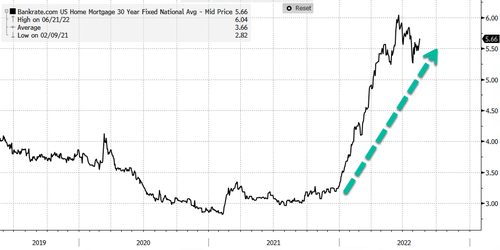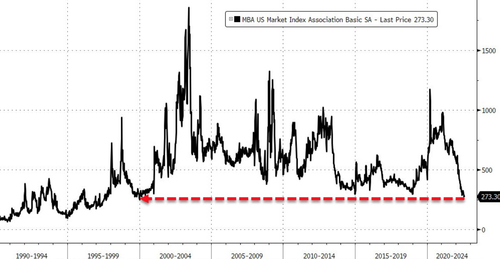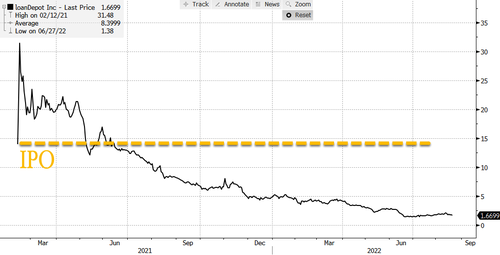Private Mortgage Lender Bust Begins As Loan Applications Crash
The US mortgage industry could be on the cusp of a bust cycle as the Federal Reserve's most aggressive interest rate hikes in decades have sent mortgage loan application volume crashing.
The 30-year fixed mortgage rate jumped from 3.27% at the start of the year to as high as 6% in mid-June, sparking what we've been warning readers about is an affordability crisis where demand for homes has evaporated.
Plunging demand for homes can be seen in the pace of mortgage application volumes, falling to levels not seen since the lows of the Dot-Com bubble implosion of 2000.
This means that the rate shock has abruptly curbed the pipeline of new loans and refinancings for mortgage companies -- where the poorly capitalized ones will fail first.
Bloomberg noted there would be "no systemic meltdown" as banks have a much less reduced exposure to mortgages post-GFC. However, that doesn't mean there won't be fireworks as private lenders begin to lay off workers and, in some cases, fail.
The "nonbanks" or independent lenders "are poorly capitalized," said Nancy Wallace, chair of the real estate group at Berkeley Haas, the business school at the University of California, Berkeley. She said when mortgage applications "tank," many of these lenders will be in "trouble."
At least this time, there are more nonbank lenders in the mortgage industry than pre-GFC. LendingPatterns said two-thirds of the top 20 lenders were nonbank, compared with about a third in 2004. Inside Mortgage Finance said banks have reduced their market share from about half in 2016 to a third.
The epicenter of the implosion will be independent lenders, such as First Guaranty, who recently filed for bankruptcy after it held onto loans it made that quickly dropped in value earlier this year while trying to package them up to sell to investors.
Court papers revealed lending volume dropped when mortgage rates spiked earlier this year. The company said it could no longer bundle new loans as its pipeline dried up. First Guaranty owes Flagstar Bank and Customers Bank approximately $418 million. It also cut hundreds of employees.
Another independent lender, LoanDepot, laid off 4,800 jobs in July as its pipeline of mortgage volume dried up.
LoanDepot CEO Frank Martell released a statement in July:
"After two years of record-breaking volumes, the market has contracted sharply and abruptly in 2022 ... We are taking decisive action to meet this challenge head-on."
LoanDepot's equity has crashed more than 75% since going public in February 2021. The question remains if the lender will follow the path of First Guaranty.
Long Island-based Sprout Mortgage is another private lender that fired its employees last month and announced it was closing up shop.
Many private lenders can no longer find enough new loans to bundle or get new credit lines to continue operating, and unlike banks, these shops have very limited mobility when it comes to tapping emergency financing lines.
"Part of the reason these companies are distressed is because the loans can't go to the GSEs for funding.
"The options for funding are more limited which is especially painful when financial conditions are tightening," said David Goodson, head of securitized credit at Voya Investment Management.
Lenders usually try to make loans worth 102 cents on the dollar to cover upfront costs, though some are taking substantial losses and can't sell them for around 85 cents.
It appears the Fed-induced rate shock is the culprit behind the implosion of the private lenders. We assume more failures are ahead.
https://ift.tt/u3cvR7B
from ZeroHedge News https://ift.tt/u3cvR7B
via IFTTT




0 comments
Post a Comment